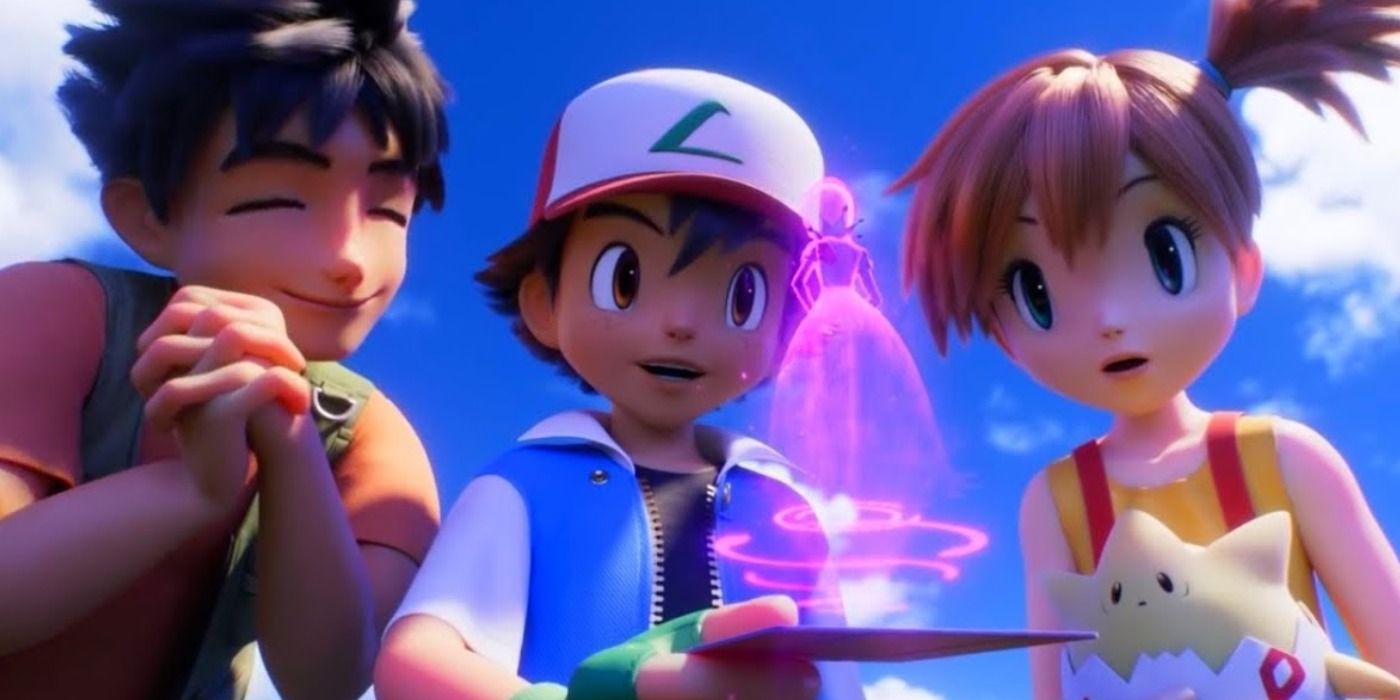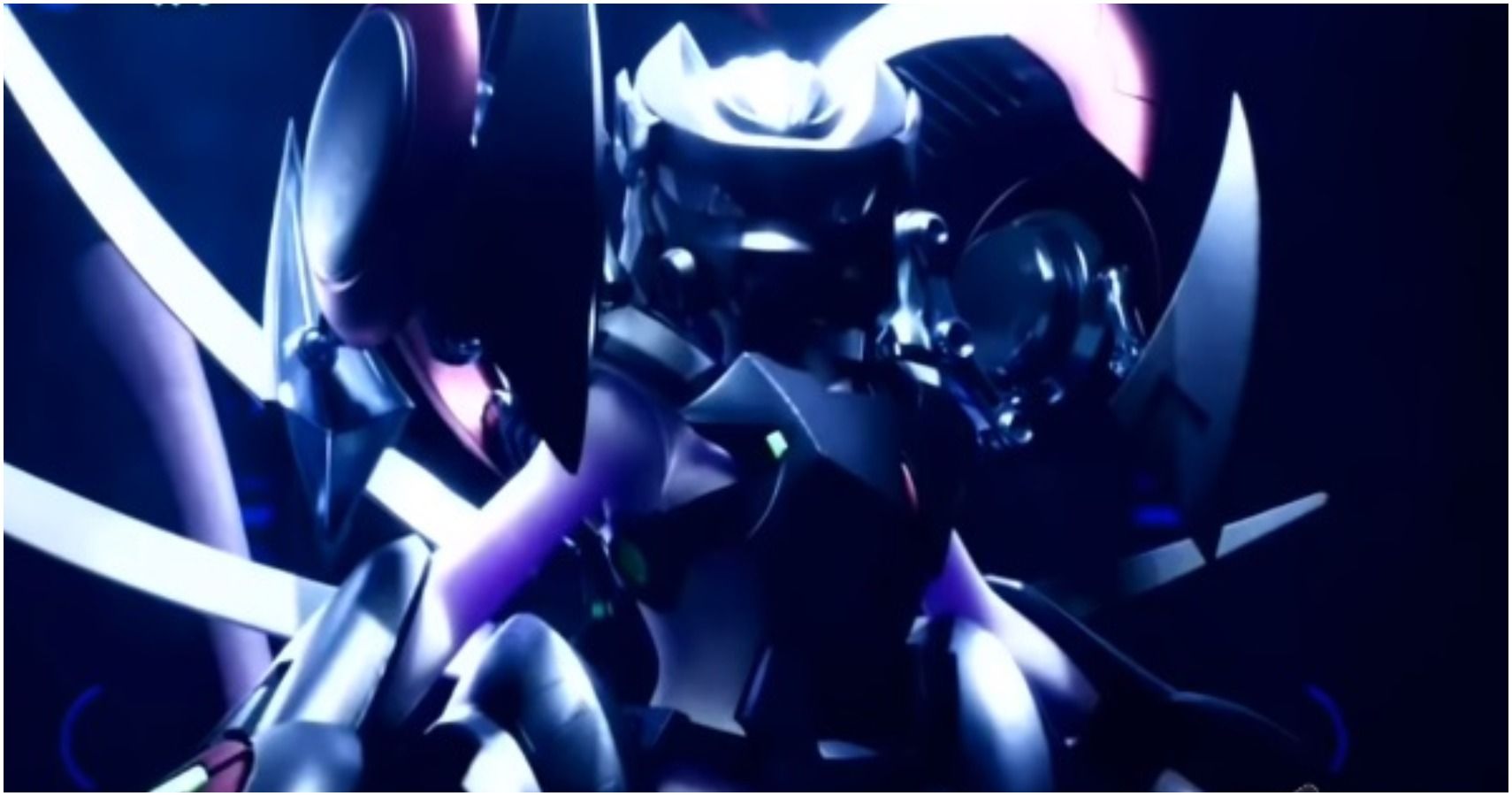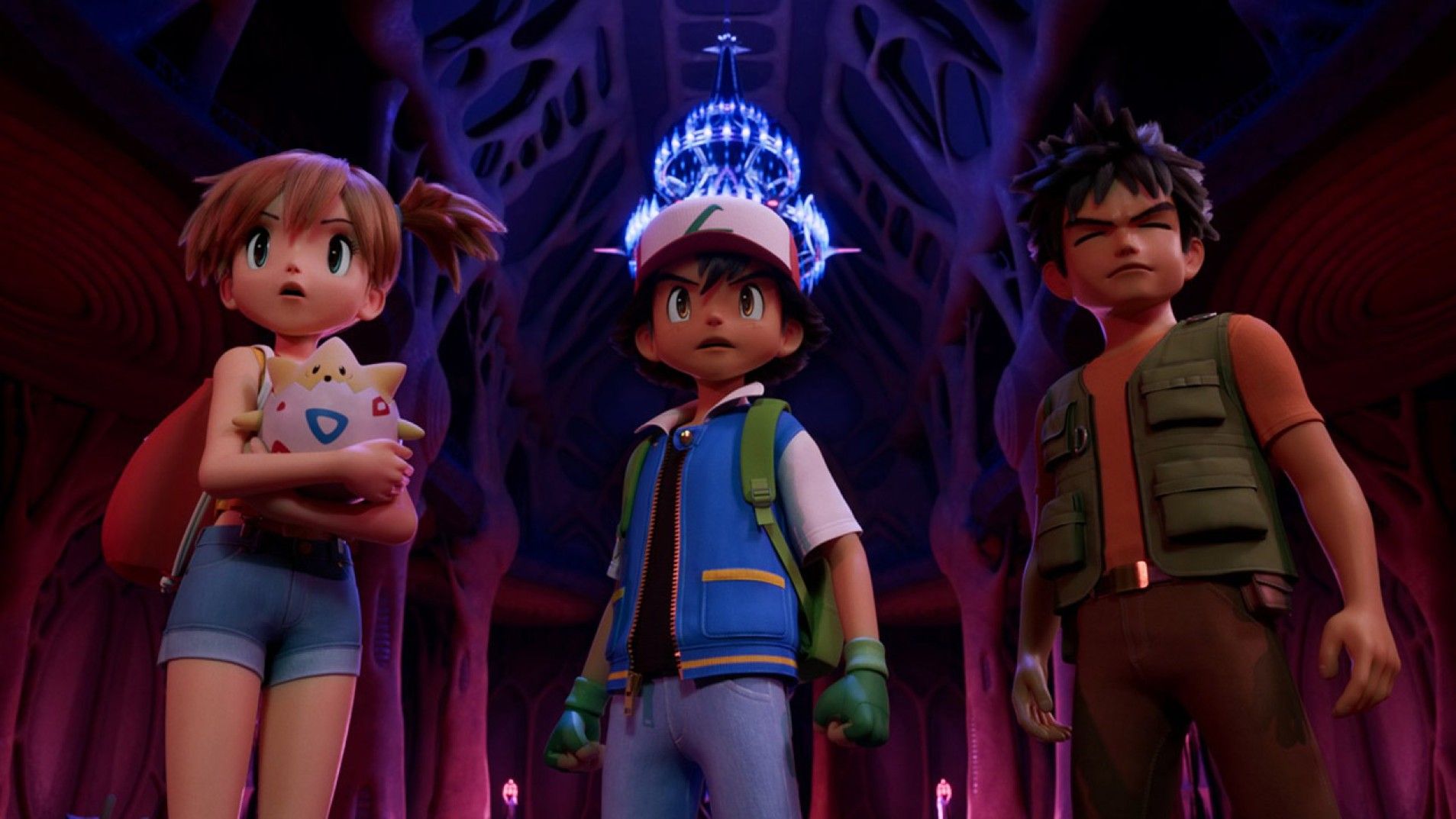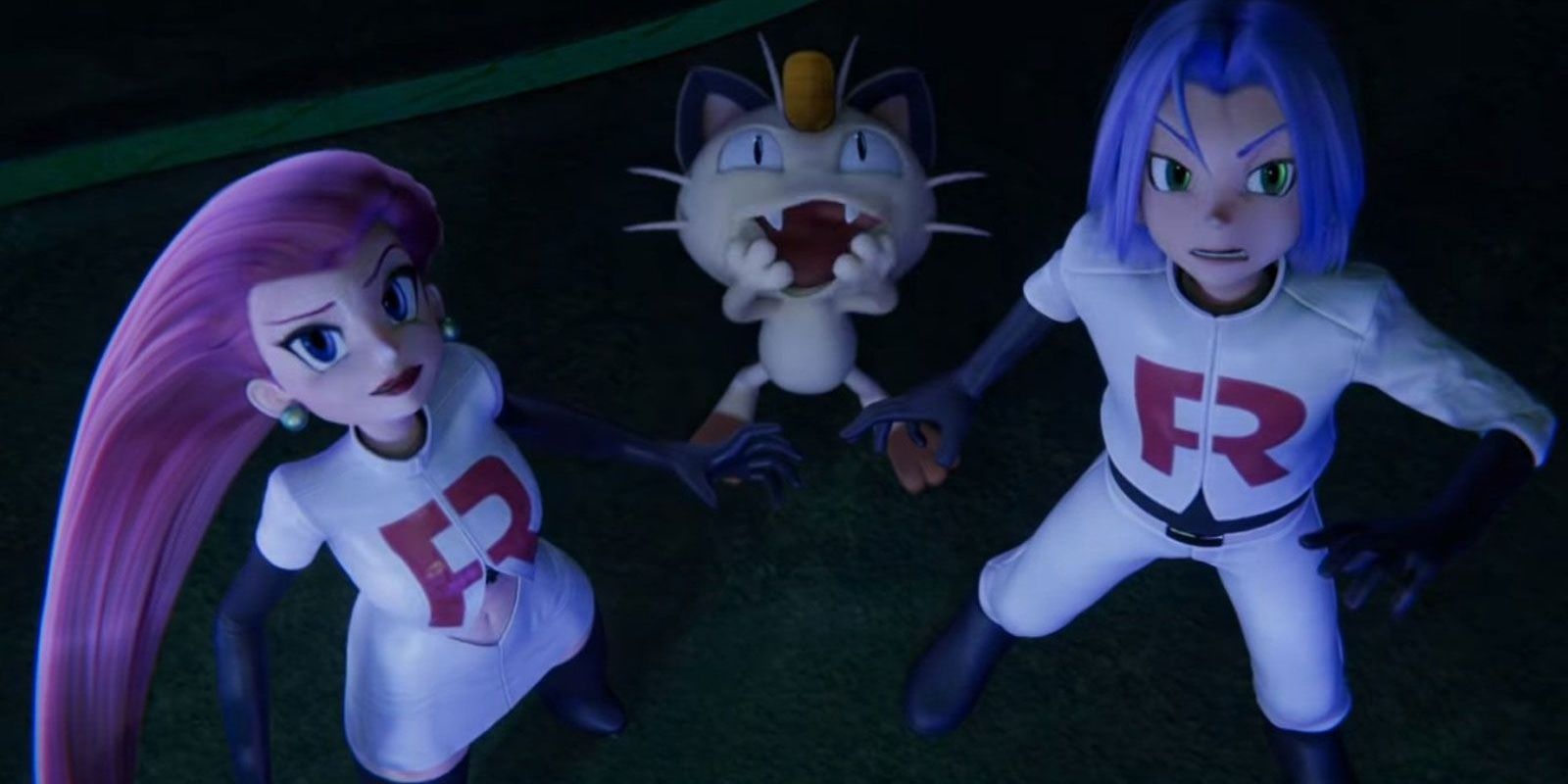Welcome back to Pokemon Movies in Review, a weekly recap of the entire Pokemon cinematic universe. This week we’re revisiting the first Pokemon movie remake: Mewtwo Strikes Back—Evolution. Considering the major differences between the original Japanese and the English version of Mewtwo Strikes Back, it’s best to think of Evolution as the third version of this story. Instead of shoring up the messy themes and flat endings of the originals, Evolution is an odd mashup of both versions. It's a missed opportunity for the movie, which would have benefited from a narrative update to match its flashy new CGI visuals. Evolution is a fun way to re-experience Mewtwo Strikes Back, but it doesn’t do anything to fix the film’s problems, and in fact, it makes some of them worse.
In the very first column of this series, I did a detailed breakdown of the differences between the original Japanese version of Mewtwo Strikes Back and the English dub. While there are a lot of minor dialogue differences throughout the movie that change our understanding of Mewtwo and the message the filmmakers wanted to send, the big changes come at the very beginning and the very end.
In the original movie, Mewtwo befriends a little girl named Ambertwo, the cloned daughter of the Scientist who created Mewtwo. Ambertwo doesn’t survive the cloning process, and the loss of its first and only friendship is the source for much of Mewtwo’s anger and resentment. Ambertwo was cut from the English version for fear that the themes were too dark for American audiences. Instead, Mewtwo learns from the scientist that he was created to be the strongest Pokemon, but realizes that they only see it as an experiment and don’t actually care about its feelings or desires. Mewtwo destroys the lab deliberately in order to punish the scientists, whereas in the original version, he destroys the lab out of uncontrollable rage and despair.
Evolution has eliminated Ambertwo and the original opening sequence, but it’s different from the original English version as well. Upon learning of his origin, Mewtwo suffers a profound existential crisis. The ambiguity of its origin and its connection to Mew overwhelms it, causing it to lash out and destroy the lab. It may seem like a subtle difference, but this existential crisis and desire to find a purpose is what drives Mewtwo to partner with Giovanni. Only after getting betrayed by him does Mewtwo first develop an anger and resentment towards humans. There’s an innocence to their first meeting that doesn’t exist in the original English version which makes Giovanni’s deception more powerful, reframing Mewtwo’s actions throughout the rest of the movie. It still doesn’t have the bite or complexity of the Ambertwo intro, but it's a slight improvement over the English dub.
The three versions of Mewtwo each have slightly different motivations for concocting their villainous plot to kidnap trainers and create clones on New Island. The original Mewtwo is the most sympathetic, while the one from the English dub is the most outwardly evil. The Mewtwo in Evolution is the most relatable of the three because it’s primarily driven by existential dread and unresolved trauma - two uniquely human experiences. Mewtwo wants to make clones that are more powerful than their originals because that’s what happened to it, and it’s trying to understand its nature and purpose in the world. Similarly, Mewtwo poses as a master Pokemon trainer and treats its Pokemon like tools of war because that’s exactly what Giovanni did to it.
These are trauma responses, and Mewtwo is reenacting the harm that was done to it in order to take control of its own narrative. These are human responses to pain and fear, and as much as I would like to say I prefer this version of Mewtwo, I can’t help but feel like cutting out Ambertwo completely neuters its arc here. Ambertwo answered Mewtwo’s existential questions with sincerity and simplicity and helped it understand that he was neither Pokemon nor human, but something in between - something it would need to discover for itself. This movie needs that relationship because it serves as an emotional anchor for Mewtwo. Without it, Mewtwo has no way to come to terms with its nature or find peace with humankind. This is why the original English dubs ending didn’t work, and as we’ll see, why Evolutions doesn’t work either.
4Kids, the company that localized the Pokemon anime and films for the first decade or so, decided that the movie needed to end with a strong message against violence. After Ash dies and comes back to life through the power of Pokemon tears - a deus ex machina I’ll never be able to make peace with - Mewtwo realizes that violence doesn’t solve anything. It’s a terrible way to resolve the plot that doesn’t fit with any of the themes or deliver any kind of satisfying conclusion to Mewtwo’s story. The original version had an ending that was slightly more on theme, but still pretty hollow. After seeing the way that Ash was willing to give his life to save Pokemon, and the way that his death affected them, Mewtwo realizes that all life has value.
Once again, this isn’t satisfying because it isn’t the message that Mewtwo actually needed to learn, and it isn’t something that the audience can take with them either. As much as the anti-violence message is incongruous with the core themes of Pokemon, at least a message you can understand. “All life has value” doesn’t exactly feel like the moral of the story here.
Evolution sticks with this version in the end, but makes a small attempt to connect it back to something that actually matters. Mewtwo tells Ash what it learned from watching him sacrifice himself: “The circumstances of one’s birth are irrelevant. It is what you do with the gift of life that determines who you are.”
Mewtwo Strikes Back frustrates me to no end because it feels like it’s always right on the cusp of saying something but never quite gets there. Evolution makes the best attempt at a coherent theme perhaps, but it still leaves us hanging. Mewtwo’s existential fear was only part of who it was, and this resolution doesn’t address the trauma of Giovanni’s betrayal and the resentment towards humanity that Mewtwo developed in response. Mewtwo took its feelings of purposelessness and anger and turned them into a plot to take over the world with clones. It needed to find a better way to resolve that pain, but all we got was “what you do determines who you are”.
Mewtwo Strikes Back picks up and drops its themes like a kid trying to play with all of their toys at the same time. Sometimes it's about the meaning of life, sometimes it’s about resentment. Later it's about empathy and respect, but it also dips a toe into self-forgiveness. The English dub of the original was about rejecting violence. To say it explores any of these themes would be too generous. At best, it glances across the room at these themes, announces that all life has value, then leaves us empty handed.
There’s a moment that perfectly captures my aggravation with this movie. It happens towards the end when all of the Pokemon and clones fight to the point of exhaustion - otherwise known as the ‘Brother My Brother’ scene. In the English Dub, James tells Jesse that he can finally see how horrible fighting is and promises never to fight again. Meowth then sees its own clone, who refuses to fight. “How can I trust you?” Meowth asks the clone, “we were born different.” In Evolution, the scene is completely different. James says that by fighting each other, the Pokemon are only hurting themselves. Jesse then says “It’s like seeing your old self battling with your present self.” Meowth then tells its clone that it doesn’t want to scratch them because it knows the clone’s claws would hurt just as much.
It's as if the filmmakers reached into a hat and pulled out a different moral before writing every line of dialogue: violence isn’t the answer, you have the power to choose your own destiny, people are all the same even if they look different or come from different places, you have to forgive yourself for the person you used to be, do unto others, sacrifice yourself to save others, friendship is the solution to every problem, Pokemon.
Next week we’re diving into the most recent Pokemon movie, Secrets of the Jungle. What a long strange road it's been.




